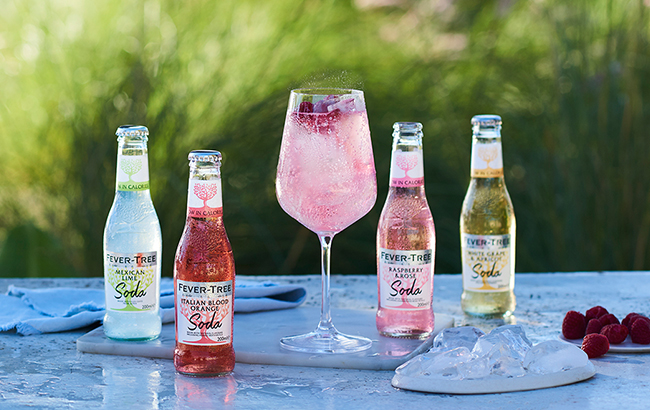Fever-Tree sales soar in US as UK declines
By Nicola CarruthersThe US helped to boost Fever-Tree sales by 3% last year, but a declining gin market in the UK impacted demand for tonic.

Fever-Tree’s total brand revenue for 2024 reached £364 million (US$471m). On a constant currency basis, the UK-based tonic and mixer company’s sales grew by 4%.
For the second half of 2024, group sales rose by 7% on a constant currency basis. It followed a flat performance for Fever-Tree in the first six months of last year.
Including sales from German distributor GDP (which Fever-Tree purchased in 2020), group revenue rose by 1% to £368.5m (US$477m) last year – up by 3% in constant currency change.
The US, which overtook the UK as Fever-Tree’s biggest market in 2023, reported revenue growth of 9% to £128m (US$165m) last year.
Sales in the US off-trade rose by 15% with the brand now more than four times bigger than its nearest premium competitor in retail.
UK sales decreased by 3% to £111.1m (US$143.8m) as a result of lower consumer spending in the on-trade, and a decline in gin.
One notable highlight was the growth of Pink Grapefruit Soda in the UK, which soared by approximately 50% last year due to the ‘increasing popularity of premium Tequila and the Paloma serve’.
The group noted that Fever-Tree remains the market leader in the UK, outperforming the mixer category in retail last year, according to IRI 2024 data.
In the UK on-trade, Fever-Tree said it had finished the year with a value share of 1.6 times its nearest competitor (CGA MAT data to 28 December 2024).
Sales in Europe were down by 2% to £92.7m (US$120m) due to the consolidation of non-Fever-Tree brands distributed by GDP in Germany.
In Europe, the Fever-Tree brand gained value share of the total mixer category and extended its lead as the largest premium mixer (based on Nielsen 2024 data of the top 12 EU markets).
The company also performed positively in Italy (up by 8% in 2024), the Netherlands (up by 5%) and Belgium (up by 8%).
The rest-of-the-world region posted 19% growth last year, led by gains in the Australian off-trade (up by 9%).
The company established a subsidiary in the market in 2023 and will begin local production in Australia at the start of 2025.
Growth beyond tonic
Tim Warrillow, co-founder and CEO of Fever-Tree, said the company had gained market share in each of its key regions, led by the company’s “deep understanding of global drinking trends”.
He added: “This was particularly noticeable in our largest region, the US, where once again the brand grew strongly and well ahead of the market.”
Warrilow highlighted that non-tonic products now make up approximately 45% of the group’s global revenue, driven by ginger beer, cocktail mixers and adult soft drinks.
In the US, Fever-Tree claimed to have extended its leadership position in the ginger beer and tonic water categories to 32% and 27% respectively, based on Nielsen data for the 2024 full year.
Fever-Tree noted that while the gin and tonic remains a popular serve in the UK, a declining gin category had shifted Fever-Tree’s focus to other product segments.
As such, the firm’s non-tonic portfolio now represents nearly 30% of UK sales (up from 10% in 2019).
Molson Coors partnership
In January 2025, Fever-Tree agreed to sell an 8.5% stake to brewing giant Molson Coors for £71m (US$88.4m) to “take the brand to the next level” in the US.
Within weeks of the announcement, Fever-Tree said its sales had “remained strong” with “good initial progress made”.
Fever-Tree noted that the partnership provides ‘upweighted’ investment in the US in the next few years and ‘strong margin improvement in the medium term as production is on-shored’.
The funding from Molson Coors has also resulted in a reduction in the working capital needed to tap into the US opportunity.
Together, the companies plan to ‘drive opportunities across both alcohol and non-alcohol occasions’ and open up new prospects for growth in categories such as adult soft drinks and ready-to-drink (RTD).
Warrilow described the collaboration as a “step change for our presence in the world’s largest premium drinks market”.
He continued: “Molson Coors’ powerful network of US distributors across both on- and off-trade, combined with its dedicated, national salesforce and deep customer relationships creates the ideal platform to maximise our brand strength and future potential across both alcohol and non-alcoholic occasions.”
Outlook for 2025
Fever-Tree expects to deliver strong group revenue and earnings before interest, tax, depreciation, amortisation (EBITDA) growth over the medium term, following the Molson Coors partnership.
The company reiterated that 2025 would be a “transition year” for its US business. As such, the firm expects sales to grow by low single digits.
The business said it would continue to deliver margin improvement across non-US regions in 2025 and 2026, before driving group margin expansion from 2027 as the firm begins to benefit from ‘significant economies of scale’ through the Molson Coors deal.
Warrilow noted: “Looking to the future, our focus remains on unlocking Fever-Tree’s long-term potential across the world and capitalising on the unique position the brand has established sitting across alcohol and non-alcohol occasions.”
Related news
US boosts Fever-Tree sales in 2025 as UK wanes
